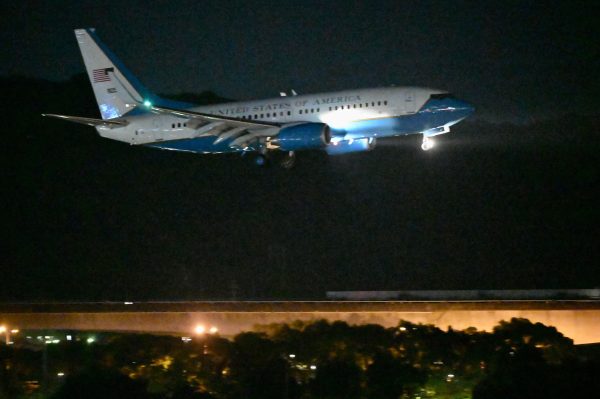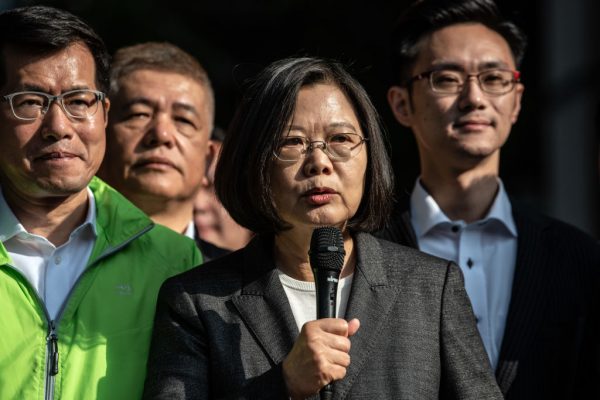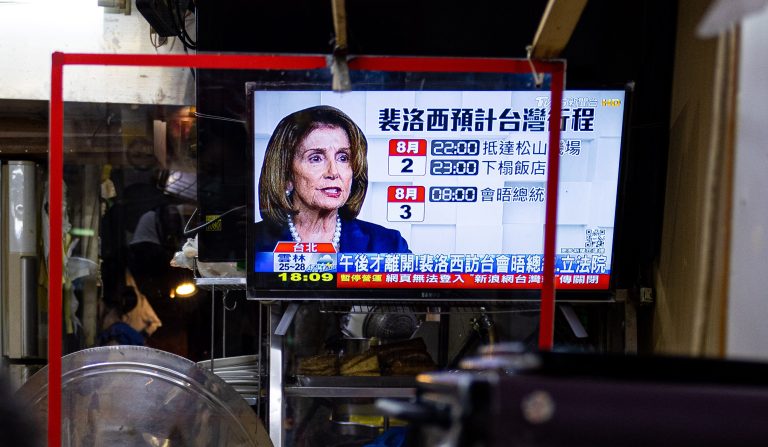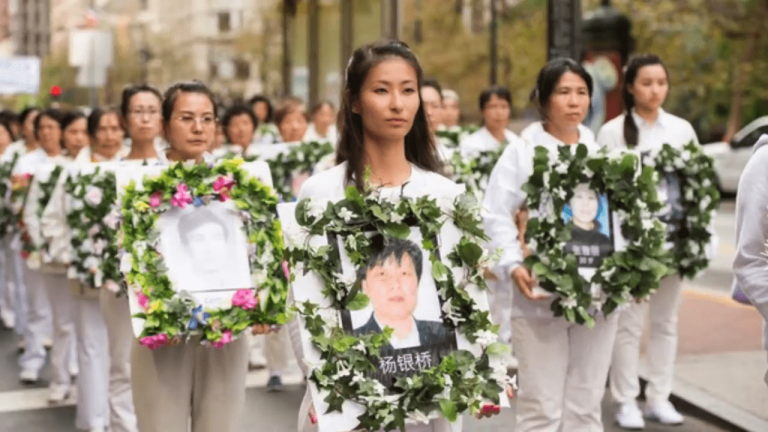Footage published on Tuesday, Aug. 2 shows U.S. Speaker of the House Nancy Pelosi being escorted by security personnel as she arrived at her hotel in Taipei, the capital of Taiwan.
The visit by America’s No. 3 official is the highest-level diplomatic contact between Washington and Taiwan in 25 years. She is expected to meet with the island’s leader Tsai Ing-wen on Wednesday.
Pelosi’s visit was the subject of heavy criticism and threats by the communist regime in mainland China, which claims Taiwan as an integral territory and vows to “recover” with force if necessary. On Aug. 1, People’s Republic of China (PRC) foreign ministry spokesman Zhao Lijian warned of “countermeasures” should the Democrat congresswoman follow through with her visit.

The day of her visit, Pelosi also had an op-ed published in the Washington Post “on why I’m leading a Congressional delegation to Taiwan.” In the article, she stressed the obligations laid out in the 1979 Taiwan Relations Act (TRA), which require the U.S. government to provide aid to Taiwan for its defense against a possible communist invasion.
READ MORE:
- Taiwan Air Force Jet Makes ‘Hard Landing’ in Hawaii After Aircraft Malfunction
- Shooting at California Church Likely ‘Politically Motivated’ by China-Taiwan Dispute
- Now Banned in Hong Kong, Vigil Honoring Victims of Tiananmen to Be Moved to Taiwan
“We must stand by Taiwan, which is an island of resilience,” Pelosi wrote, praising the island for its democratic governance, response to the COVID-19 pandemic, and for being a “leader in peace, security and economic dynamism: with an entrepreneurial spirit, culture of innovation and technological prowess that are envies of the world.”
Success
You are now signed up for our newsletter
Success
Check your email to complete sign up
She also lauded Taiwan as being “proudly led by a woman, President Tsai Ing-wen.”
Yet the PRC “has ramped up patrols of bombers, fighter jets and surveillance aircraft near and even over Taiwan’s air defense zone,” Pelosi wrote, describing Beijing’s moves as a disturbing threat to the island.
Taiwan and a few smaller islands are officially governed as the Republic of China (ROC), which once controlled all of China but was pushed off the mainland by communist rebel forces.
Until 1971, the United Nations recognized the ROC as China’s legitimate government, but the seat was turned over to Beijing that year as multiple major powers began to acknowledge the PRC. The U.S. under President Jimmy Carter switched recognition to Beijing in 1979, with the TRA functioning as a caveat to ensure Taipei’s security.
“Today, America must remember that vow,” Pelosi wrote. “In the face of the Chinese Communist Party’s (CCP) accelerating aggression, our congressional delegation’s visit should be seen as an unequivocal statement that America stands with Taiwan, our democratic partner, as it defends itself and its freedom.”
At the same time, she stressed that the Congressional delegation’s visit “in no way contradicts the long-standing one-China policy” and other laws dictating America’s position on Taiwan.
While the Taiwanese government maintains formal claims to the former ROC territory, President Tsai and her Democratic Progressive Party (DPP) aim to make Taiwan an officially independent country.

Formal independence for Taiwan, however, is largely seen as an impasse, given that the Chinese Communist Party (CCP) has indicated this would be cause for immediate armed conflict.
- Russian Invasion of Ukraine Casts an Ominous Shadow Over Taiwan
- Chinese Navy Launches 3rd Carrier, Deploying New Electromagnetic Launch Technology
- Taiwan Rebuffs Chinese Propaganda Claims That Afghanistan’s Fate Is an ‘Omen’ for the Island
“The United States continues to oppose unilateral efforts to change the status quo,” Pelosi wrote, echoing the position of National Security Council spokesperson John Kirby who on Monday said that the U.S. does not “support Taiwan independence.”
U.S. President Joe Biden in late July expressed disapproval of Pelosi’s planned visit, but the White House has backed her right to travel to Taiwan, CCP pressure notwithstanding.
“Nothing has changed — nothing has changed — about our Taiwan policy,” Kirby told reporters, and asked media not to create “drama” over Pelosi’s visit.
“What we would hope they [Beijing] infer from everything we’ve done, and everything we’ve said, including during the president’s phone call, is that we’re being consistent,” he said.
The CCP tolerates informal relations between Taiwan and other countries, but views visits by foreign officials as unwelcome steps toward recognition of the ROC or support for what Beijing calls “Taiwan independence forces.”
Popular attitudes among Taiwan’s people have largely turned against the PRC in recent years, with many pointing to the destruction of Hong Kong’s freedoms under the National Security Law (NSL) as the inevitable fruit of close relations with the CCP (Hong Kong was returned to China from British colonial rule in 1997 with guarantees that the city would keep its unique political system).
In addition, a vast majority of young Taiwanese view themselves as non-Chinese by identity, following the promotion of “Taiwanization” policies in culture and education starting in the 1990s.














